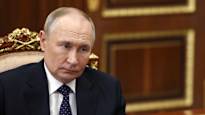Russia made an unprecedented missile attack on Ukraine’s Dnipro on Thursday morning. Putin took advantage of the attack to scare the West, writes Russia correspondent Heikki Heiskanen.
Heikki HeiskanenRussia correspondent
MOSCOW On Thursday evening, it became clear why the press secretary of the Kremlin Dmitry Peskov and an official representative of the Ministry of Foreign Affairs Maria Zakharova had refrained from commenting on the Russian missile attack on the Ukrainian Dnipro. The speech was booked to Vladimir Putin to himself.
The televised statement was intended to be as chilling as possible. Putin told Russia that he tested a new medium-range missile called Orešnik in Dnipro.
So this was Russia’s response to Ukraine’s attacks with US ATACMS and British Storm Shadows missiles on Russian territory.
The answer had been expected and even feared, because in September Putin warned that the use of missiles would mean that NATO would participate in the war against Russia directly.
– We consider ourselves entitled to use our weapons against the military targets of countries that allow their weapons to be used against our targets. If aggressive actions are accelerated, we will respond decisively and symmetrically, Putin said on Thursday.
So the missile strike was Putin’s way of communicating. It follows Putin signing a revised version of Russia’s nuclear weapons program on Monday. The formulation of the new doctrine lowered the threshold for the use of nuclear weapons.
Russia is now trying to incite uncertainty and fear so that Ukraine and its Western allies would have to carefully consider new missile strikes. Is Putin really ready to strike the military targets of NATO countries or is the talk just a bluff?
Speaking in game terms is insidious: state leaders make moves, play interdimensional chess, raise stakes, peck, bluff, and watch bluffs. However, war is no joke, and decisions cost lives.
With his harsh words, Putin is also painting himself into a corner. When it came down to it, he would have to carry out his threat, so as not to appear weak. Looking weak tends to be a superpower leader’s worst nightmare. Many mistakes have been made just to avoid it.
You can consider it a small positive featurethat Russia warned the United States about the missile strike in advance, in a line intended to reduce the risks of a nuclear war.
So some kind of precautions are still in place, even though the United States and Russia have dismantled the system of nuclear weapons restrictions created at the end of the Cold War.
Putin said Thursday that the U.S. made a mistake when it scrapped the treaty banning intermediate-range missiles in 2019. The Orešnik is just such a missile. Putin boasted that the missile is hypersonic, i.e. it flies multiple times the speed of sound, and no air defense system can stop it.
Russia and the United States are now blaming each other of escalation, of accelerating tensions.
Space before Donald Trump’s becoming president next January threatens to prove dangerous. President Joe Biden try to support Ukraine while you still have time. Russia is looking for the strongest possible positions for Trump’s possible negotiation attempts.
On the other hand, Trump’s expectation may restrain the Russian leadership from making too steep bets.
Missiles bring a special drama to the situation, but most experts do not see them as game-changing in terms of the big picture of the war.
Ukraine’s biggest problem on the battlefield is the lack of manpower. It is not easy for Russia to fill the ranks of the armed forces either, but the situation in Ukraine is more desperate.
On the other hand, the state of the Russian economy is not necessarily as sunny as Putin would like to believe.
The Central Bank of Russia has fought persistently against high inflation by already raising the key interest rate to 21 percent. The difficulty is that prices are driven up by the combination of a hot military industry and a labor shortage. The interest rate hike doesn’t want to bite into that, but high interest rates slow down the rest of the economy.
Economists are already seeing signs of stagflation, where inflation, i.e. rising prices, is combined with slow growth.
So there may be behind-the-scenes pressure in Russia to seek a negotiated solution to the war.
Putin has presented tough conditions to the public for a ceasefire: Ukraine should completely withdraw its forces from the regions of Donetsk, Luhansk, Kherson and Zaporizhzhia and give up the pursuit of NATO membership. So Russia does not yet occupy these mentioned areas completely.
Recently Reuters reported based on anonymous Russian sources, that Putin could nevertheless be ready to freeze the situation approximately at the current front lines. This could be some kind of test ball from the Kremlin.
